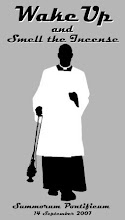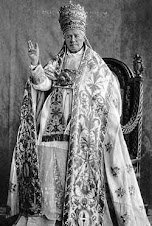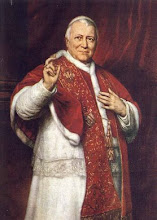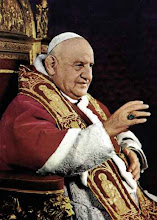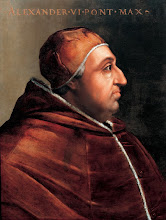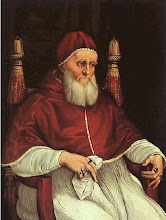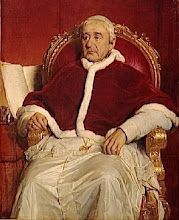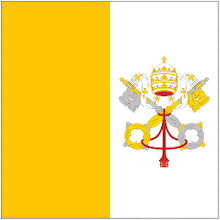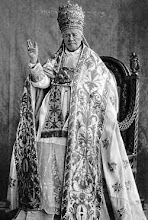%253B_Sebastiano_Ricci.jpg)
"Have a merry and blessed Christmas from Radical Papist Blog!"
Venerable Pope Pius XII Christmas Message of 1942.
My Dear Children of the Whole World:
As the Holy Christmas Season comes round each year, the message of Jesus, Who is light in the midst of darkness, echoes once more from the Crib of Bethlehem in the ears of Christians and re-echoes in their hearts with an ever new freshness of joy and piety. It is a message which lights up with heavenly truth a world that is plunged in darkness by fatal errors. It infuses exuberant and trustful joy into mankind, torn by the anxiety of deep, bitter sorrow. It proclaims liberty to the sons of Adam, shackled with the chains of sin and guilt. It promises mercy, love, peace to the countless hosts of those in suffering and tribulation who see their happiness Shattered and their efforts broken in the tempestuous strife and hate of our stormy days.
The church bells, which announce this message in every continent, not only recall the gift which God made to mankind at the dawn of the Christian Era; they also announce and proclaim a consoling reality of the present, a reality which is eternally young, living and life-giving; it is the reality of the "True Light which enlighteneth every man that cometh into this World," and which knows no setting. The Eternal Word, Who is the Way, the Truth and the Life, began His mission of saving and redeeming the human race by being born in the squalor of a stable and by thus ennobling and hallowing poverty.
He thus proclaimed and consecrated a message which is still, today, the Word of Eternal Life. That message can solve the most tortuous questions, unsolved and insoluble for those who bring to their investigations a mentality and an apparatus which are ephemeral and merely human; and those questions stand up, bleeding, imperiously demanding an answer, before the thought and the feeling of embittered and exasperated mankind.
The watchword "I have compassion on the multitude" is for Us a sacred trust which may not be abused; it remains strong, and impelling in all times and in all human situations, as it was the distinguishing mark of Jesus.
The Church would be untrue to herself, ceasing to be a mother, if she turned a deaf ear to her children's anguished cries, which reach her from every class of the human family. She does not intend to take sides for any of the particular forms in which the several peoples and States strive to solve the gigantic problems of domestic order or international collaboration, as long as these forms conform to the law of God. But on the other hand, as the "Pillar and Ground of Truth" and guardian, by the will of God and the mandate of Christ, of the natural and supernatural order, the Church cannot renounce her right to proclaim to her sons and to the whole world the unchanging basic laws, saving them from every perversion, frustration, corruption, false interpretation and error.
This is all the more necessary for the fact that from the exact maintenance of these laws, and not merely by the effort of noble and courageous wills, depends in the last analysis the solidity of any national and international order, so fervently desired by all peoples. We know the qualities of courage and sacrifice of those peoples, and We also know their straitened conditions and their sorrow; and in this hour of unspeakable trial and strife We feel Ourselves bound to each and every one of them without exception, by a deep, all-embracing, unmovable affection, and by an immense desire to bring them every solace and help which is in any way at Our command.
Primary Elements of Social Life
In our last Christmas Message, We expounded the principles- which Christian thought suggests, for the establishment of an international order of friendly relations and collaboration such as to conform to the demands of God's Law. Today We shall, with the consent, We feel, and the interested attention of all upright men, pause to consider very carefully and with equal impartiality, the fundamental laws of the internal order of the States and peoples.
International relations and internal order are intimately related. International equilibrium and harmony depend on the internal equilibrium and development of the individual States in the material, social and intellectual spheres. A firm steady peace policy towards other nations is, in fact, impossible without a spirit of peace within the nation which inspires trust. It is only, then, by striving for an integral peace, a peace in both fields, that people will be freed from the cruel nightmare of war, and the material and psychological causes of further discord and disorder will be diminished in a desire for peace, and hence aims at attaining peace, that "tranquil living together in order" in which St. Thomas finds the essence of peace. Two primary elements, then, regulate social life, a living together in order, and a living together in tranquillity.
Order
Order, which is fundamental in an association of men (of beings, that is, who strive to attain an end appropriate to their nature) is not merely external linking up of parts which are numerically distinct. It is rather, and must be, a tendency and an ever more perfect approach to an internal union; and this does not exclude differences founded in fact and sanctioned by the will of God or by supernatural standard.
A clear understanding of the genuine fundamentals of all social life has a capital importance today as never before, when mankind, impregnated by the poison of error and social aberrations, tormented by the fever of discordant desires, doctrines, and aims, is excitedly tossing about in the disorder which it has itself created, and is experiencing the destructive force of false ideas that disregard the Law of God or are opposed to it. And since disorder can only be overcome by an order which is not merely superimposed and fictitious (just as darkness with its fearful and depressing effects can only be driven away by light and not by will o' the wisps); so security, reorganizations, progressive improvement cannot be expected and cannot be brought about unless by a return of large and influential sections to correct notions about security.
It is a return which calls for the Grace of God in large measure, and for a resolute will, ready and prepared for sacrifice on the part of good farseeing men. From these influential circles who are more capable of penetrating and appreciating the beauty of just social norms, there will pass on and infiltrate into the masses the clear knowledge of the true, divine, spiritual origin of social life. Thus the way will be cleared for the reawakening, the growth and fixing of those moral principles without which even the proudest achievements create but a Babel in which the citizens, though they live inside the same walls, speak different and incoherent languages.
From individual and social life we should rise to God, the First Cause and Ultimate Foundation, as He is the Creator of the first conjugal society, from which we have the society which is the family, and the society of peoples and of nations. As an image, albeit imperfect, of its Exemplar, the One and Triune God, Who through the Mystery of the Incarnation, redeemed and raised human nature, life in society, in its ideals and in its end, possesses by the light of reason and of revelation a moral authority and an absoluteness which transcend every temporal change. It has a power of attraction that, far from being weakened or lessened by delusions, errors, failures, draws irresistibly the noblest and most faithful souls to the Lord, to take up with renewed energy, with added knowledge, with new studies, methods and means, the enterprises which in other times and circumstances were tried in vain.
The origin and the primary scope of social life is the conservation, development and perfection of the human person, helping him to realize accurately the demands and values of religion and culture set by the Creator for every man and for all mankind, both as a whole and in its natural ramifications.
A social teaching or a social reconstruction program which denies or prescinds from this internal essential relation to God of everything that regards men, is on a false course; and while it builds up with one hand, it prepares with the other the materials which sooner or later will undermine and destroy the whole fabric. And when it disregards the respect due to the human person and to the life which is proper to that person, and gives no thought to it in its organization, in legislative and executive activity, then instead of serving society, it harms it; instead of encouraging and stimulating social thought, instead of realizing its hopes and expectations, it strips it of all real value and reduces it to a utilitarian formula which is openly rejected by constantly increasing groups.
If social life implies intrinsic unity, it does not, at the same time, exclude differences which are founded in fact and nature. When we hold fast to God, the Supreme Controller of all that relates to man, then the similarities no less than the differences of men find their allotted place in the fixed order of being, of values, and hence also of morality. When, however, this foundation is removed, there is a dangerous lack of cohesion in the various spheres of culture; the frontier of true value becomes uncertain and shifting, even to the point where mere external factors, and often blind instincts, come to determine, according to the prevalent fashion of the day, who is to have control of this or that direction.
After the fateful economy of the past decades, during which the lives of all citizens were subordinated to the stimulus of gain, there now succeeds another and no less fateful policy which, while it considers everybody with reference to the State, excludes all thought of ethics or religion. This is a fatal travesty, a fatal error. It is calculated to bring about far-reaching consequences for social life, which is never nearer to losing its noblest prerogatives than when it thinks it can deny or forget with impunity the external source of its own dignity: God.
Reason, enlightened by faith, assigns to individuals and to particular societies in the social organization a definite and exalted place. It knows, to mention only the most important, that the whole political and economic activity of the State is directed to the permanent realization of the common good.
In a conception of society which is pervaded and sanctioned by religious thought, the influence of economics and of every other sphere of cultural activity represents a universal and most exalted center of activity, very rich in its variety and coherent in its harmony, in which men's intellectual equality and diversity of occupation come into their own and secure adequate expression. When this is not so, work is depreciated and the worker is belittled.
That social life, such as God willed it, may attain its scope, it needs a juridical order to support it from without, to defend and protect it. The function of this juridical order is not to dominate but to serve, to help the development and increase of society's vitality in the rich multiplicity of its ends, leading all the individual energies to their perfection in peaceful completion, and defending them with appropriate and honest means against all that may militate against those who only by this means can be held within the noble discipline of social life. But in the just fulfillment of this right, an authority which is truly worthy of the name will always be painfully conscious of its responsibility in the sight of the Eternal Judge, before Whose Tribunal every wrong judgment, and especially every revolt against the order established by God, will receive without fail its sanction and its condemnation.
The precise, bedrock, basic rules that govern society cannot be prejudiced by the intervention of human agency. They can be denied, overlooked, despised, transgressed, but they can never be overthrown with legal validity. It is true indeed that, as time goes on, conditions of life change. But there is never a complete break or a complete discontinuity between the law of yesterday and that of today, between the disappearance of old powers and constitutions and the appearance of a new order. In any case, whatever be the change or transformation, the scope of every social life remains identical, sacred, obligatory; it is the development of the personal values of man as the image of God; and the obligation remains with every member of the human family to realize his unchangeable destiny, whosoever be the legislator and the authority whom he obeys.
In consequence, there always remains, too, his inalienable right, which no opposition can nullify—a right which must be respected by friend and foe—to a legal order and practice which appreciate and understand that it is their essential duty to serve the common good.
The juridical order has, besides, the high and difficult scope of insuring harmonious relations both between individuals and between societies, and within these. This scope will be reached if legislators will abstain from following those perilous theories and practices, so harmful to communities to their spirit of union, which derive their origin and promulgation from false postulates. Among such postulates We must count the juridical positivism which attributes a deceptive majesty to the setting up of purely human laws, and which leaves the way open for a fatal divorce of law from morality.
There is, besides, the conception which claims for particular nations, or classes, the juridical instinct as the final imperative and the norm from which there is no appeal; finally, there are those various theories which, differing among themselves, and deriving from opposite ideologies, agree in considering the State, or a group which represents it, as an absolute and supreme entity, exempt from control and from criticism even when its theoretical and practical postulates result in and offend by, their open denial of essential tenets of the human Christian conscience.
Anyone who considers with an open and penetrating mind the vital connection between social order and a genuine juridical order, and who is conscious of the fact that internal order in all its complexity depends on the predominance of spiritual forces, on the respect of human dignity in oneself and in others, on the love of society and of its God-given ends, cannot wonder at the sad effects of juridical conceptions which, far from the royal road of truth, proceed on the insecure ground of materialistic postulates. But he will realize at once the urgent need of a return to a conception of law which is spiritual and ethical, serious and profound, vivified by the warmth of true humanity and illumined by the splendor of the Christian Faith, which bids us seek in the juridical order an outward refraction of the social order willed by God, a luminous product of the spirit of man which is in turn the image of the Spirit of God.
On this organic conception which alone is living, in which the noblest humanity and the most genuine Christian spirit flourish in harmony, there is marked the Scripture thought, expounded by the great Aquinas: —The work of justice shall be peace—a thought which is applicable to the internal as to the external aspect of social life. It admits of neither contrast nor alternative such as expressed in the disjunction, love or right, but of the fruitful synthesis, love and right. In the one as in the other, since both radiate from the same Spirit of God, We read the program and the seal of the human spirit; they complement one another, give each other life and support, walk hand in hand along the road of concord and pacification, while right clears the way for love and love makes right less stern, and gives it a higher meaning. Both elevate human life to that social atmosphere where, even amid the failings, the obstacles and the difficulties of this earth a fraternal community of life is made possible.
But once let the baneful spirit of materialist ideas predominate; let the urge for power and for predominance take in its rough hands the direction of affairs; you shall then find its disruptive effects appearing daily in greater measure; you shall see love and justice disappear; all this as the sad foretaste of the catastrophes that menace society when it abandons God.
Tranquillity
The second fundamental element of peace, towards which every human society tends almost instinctively, is tranquillity.
O blessed tranquillity, thou has nothing in common with the spirit of holding fixedly and obstinately, unrelenting and with childish stubbornness, to things as they are; nor yet with the reluctance—child of cowardice and selfishness—to put one's mind to the solution of problems and questions which the passage of time and the succession of generations, with their different needs and progress, make actual, and bring up a burning question of the day. But for a Christian who is conscious of his responsibilities even towards the least of his brethren, there is no such thing as slothful tranquillity; nor is there question of flight, but of struggle, of action against every inaction and desertion in the great spiritual combat where the stakes are the construction, nay the very soul, of the society of tomorrow.
In the mind of Aquinas, tranquillity and feverish activity are not opposed, but rather form a well-balanced pair for him who is inspired by the beauty and the urgency of the spiritual foundations of society, and of the nobility of its ideals. To you, young people, who are wont to turn your back on the past, and to rely on the future for your aspirations and your hopes, We address Ourselves with ardent love and fatherly anxiety; enthusiasm and courage do not of themselves suffice, if they be not, as they should be, placed in the service of good and of a spotless cause. It is vain to agitate, to weary yourselves, to bustle about without ever resting. You must be inspired with the conviction that you are fighting for truth, that you are sacrificing in the cause of truth your own tastes and energies wishes, and sacrifices; that you are fighting for the eternal laws of God, for the dignity of the human person, and for the attainment of its destiny.
When mature men and young men, while remaining always at anchor, in the sea of the eternally active tranquillity of God, coordinate their differences of temperament and activity in a genuine Christian spirit, then if the propelling element is joined to the refraining element, the natural differences between the generations will never become dangerous, and will even conduce vigorously to the enforcement of the eternal laws of God in the changing course of times and of conditions of life.
In one field of social life, where for a whole century there was agitation and bitter conflict, there is today a calm, at least on the surface. We speak of the vast and ever growing world of labor, of the immense army of workers, of breadwinners and dependents. If we consider the present with its wartime exigencies, as an admitted fact, then this calm may be called a necessary and reasonable demand; but if we look at the present situation in the light of justice, and with reference to a legitimately regulated labor movement, then the tranquillity will remain only apparent, until the scope of such a movement be attained.
Always moved by religious motives, the Church has condemned the various forms of Marxist Socialism; and she condemns them today, because it is her permanent right and duty to safeguard men from currents as thought and influences that jeopardize their external salvation. But the Church cannot ignore or overlook the fact that the worker in his efforts to better his lot, is opposed by a machinery which is not only not in accordance with nature, but is at variance with God's plan and with the purpose He had in creating the goods of earth.
In spite of the fact that the ways they followed were and are false and to be condemned, what man, and especially what priest or Christian, could remain deaf to the cries that rise from the depths and call for justice and a spirit of brotherly collaboration in a world ruled by a just God? Such silence would be culpable and unjustifiable before God, and contrary to the inspired teaching of the Apostle, who, while he inculcates the need of resolution in the fight against error, also knows that we must be full of sympathy for those who err, and open-minded in our understanding of their aspirations, hopes and motives.
When He blessed our first parents, God said: "Increase and multiply and fill the earth and subdue it." And to the first father of a family, He said later: "In the sweat of thy face shalt thou eat bread." The dignity of the human person, then, requires normally as a natural foundation of life the right to the use of the goods of the earth. To this right corresponds the fundamental obligation to grant private ownership of property, if possible, to all. Positive legislation regulating private ownership may change and more or less restrict its use. But if legislation is to play its part in the pacification of the community, it must prevent the worker, who is or will be a father of a family, from being condemned to an economic dependence and slavery which is irreconcilable with his rights as a person. Whether this slavery arises from the exploitation of private capital or from the power of the state, the result is the same. Indeed, under the pressure of a State which dominates all and controls the whole field of public and private life, even going into the realm of ideas and beliefs and of conscience, this lack of liberty can have the more serious consequences, as experience shows and proves.
Five Points for Ordering Society
Anyone who considers in the light of reason and of faith the foundations and the aims of social life, which we have traced in broad outline, and contemplates them in their purity and moral sublimity, and in their benefits in every sphere of life, cannot but be convinced of the powerful contribution to order and pacification which efforts directed towards great ideals and resolved to face difficulties, could present, or better, could restore to a world which is internally unhinged, when once they had thrown down the intellectual and juridical barriers, created by prejudice, errors, indifferences, and by a long tradition of secularization of thought, feeling, action which succeeded in detaching and subtracting the early city from the light and force of the City of God. Today, as never before, the hour has come for reparation, for rousing the conscience of the world from the heavy torpor into which the drugs of false ideas, widely diffused, have sunk it. This is all the more so because in this hour of material and moral disintegration the appreciation of the emptiness and inconsistency of every purely human order is beginning to disillusion even those who, in days of apparent happiness, were not conscious of the need of contact with the eternal in themselves or in society, and did not look upon its absence as an essential defect in their constitutions. What was clear to the Christian, who in his deeply founded faith was pained by the ignorance of others, is now presented to us in dazzling clearness by the din of appalling catastrophe which the present upheaval brings to man and which portrays all the terrifying lineaments of a general judgment even for the tepid, the indifferent, the frivolous. It is indeed, an old truth which comes out in ever new forms and thunders through the ages and through the nations from the mouth of the Prophet: "All that forsake thee shall be confounded; they who depart from thee, shall be written in the earth; because they have forsaken the Lord, the Vein of Living Waters."
The call of the moment is not lamentation but action; not lamentation over what has been, but reconstruction of what is to arise and must arise for the good of society. It is for the best and most distinguished members of the Christian family, filled with the enthusiasm of Crusaders, to unite in the spirit of truth, justice and love to the call; God wills it, ready to serve, to sacrifice themselves, like the Crusaders of old.
If the issue was then the liberation of the land hallowed by the life of the Incarnate Word of God, the call today is, if We may so express Ourselves, to traverse the sea of errors of our day and to march on to free the holy land of the spirit, which is destined to sustain in its foundations the unchangeable norms and laws on which will rise a social construction of solid internal consistency. With this lofty purpose before Us, We turn from the crib of the Prince of Peace, confident that His grace is diffused in all hearts, to you, beloved children, who recognized and adore in Christ your Savior; We turn to all those who are united with Us at least by the bond of faith in God; We turn, finally to all those who would be free of doubt and error, and who desire light and guidance; and We exhort you with suppliant paternal insistence not only to realize fully the dreadful gravity of this hour, but also to meditate upon the vistas of good and supernatural benefit which it opens up, and to unite and collaborate towards the renewal of society in spirit and truth.
The essential aim of this necessary and holy crusade is that the Star of Peace, the Star of Bethlehem, may shine out again over the whole mankind in all its brilliant splendor and reassuring consolation as a pledge and augury of a future better, more fruitful and happier. It is true that the road from night to full day will be long; but of decisive importance are the first steps on the path, the first five mile-stones of which bear chiseled on them the following maxims:
1. Dignity of the Human Person. He who would have the Star of Peace shine out and stand over society should cooperate, for his part, in giving back to the human person the dignity given to it by God from the very beginning; should oppose the excessive herding of men, as if they were a mass without a soul; their economic, social, political, intellectual and moral inconsistency; their dearth of solid principles and strong convictions, their surfeit of instinctive sensible excitement and their fickleness.
He should favor, by every lawful means, in every sphere of life, social institutions in which a full personal responsibility is assured and guaranteed both in the early and the eternal order of things. He should uphold respect for and the practical realization of the following fundamental personal rights; the right to maintain and develop one's corporal, intellectual and moral life and especially the right to religious formation and education; the right to worship God in private and public and to carry on religious works of charity; the right to marry and to achieve the aim of married life; the right to conjugal and domestic society; the right to work, as the indispensable means towards the maintenance of family life; the right to free choice of state of life, and hence, too, of the priesthood or religious life; the right to the use of material goods; in keeping with his duties and social limitations
2. Defense of Social Unity. He who would have the Star of Peace shine out and stand over society should reject every form of materialism which sees in the people only a herd of individuals who, divided and without any internal cohesion, are considered as a mass to be forded over and treated arbitrarily; he should strive to understand society as an intrinsic unity, which has grown up and matured under the guidance of Providence, a unity which within the bounds assigned to it and according to its own peculiar gifts—tends, with the collaboration of the various classes and professions, towards the eternal and ever new aims of culture and religion.
He should defend the indissolubility of matrimony; he should give to the family—that unique cell of the people—space, light and air so that it may attend to its mission of perpetuating new life, and of educating children in a spirit corresponding to its own true religious convictions, and that it may preserve, fortify and reconstitute, according to its powers, its proper economic, spiritual, moral and juridic unity. He should take care that the material and spiritual advantages of the family be shared by the domestic servants; he should strive to secure for every family a dwelling where a materially and morally healthy family life may be seen in all its vigor and worth; he should take care that the place of work be not so separated from the home as to make the head of the family and educator of the children a virtual stranger to his own household; he should take care above all that the bond of trust and mutual help should be reestablished between the family and the public school, that bond which in other times gave such happy results, but which now has been replaced by mistrust where the school, influenced and controlled by the spirit of materialism, corrupts and destroys what the parents have instilled into the minds of the children.
3. Dignity of Labor. He who would have the Star of Peace shine out and stand over society should give to work the place assigned to it by God from the beginning. As an indispensable means towards gaining over the world that mastery which God wishes, for His glory, all work has an inherent dignity and at the same time a close connection with the perfection of the person; this is the noble dignity and privilege of work which is not any way cheapened by the fatigue and the burden, which have to be borne as the effect of original sin, in obedience and submission to the will of God.
Those who are familiar with the great Encyclicals of Our predecessors and Our Own previous messages know well that the Church does not hesitate to draw the practical conclusions which are derived from the moral nobility of work, and to give them all the support of her authority. These exigencies include, besides a just wage which covers the needs of the worker and his family, the conservation and perfection of a social order which will make possible an assured, even if modest, private property for all classes of society, which will promote higher education for the children of the working class who are especially endowed with intelligence and good will, will promote the care and the practice of the social spirit in one's immediate neighborhood, in the district, the province, the people and the nation, a spirit which, by smoothing over friction arising from privileges or class interests, removes from the workers the sense of isolation through the assuring experience of a genuinely human, and fraternally Christian, solidarity.
The progress and the extent of urgent social reforms depend on the economic possibilities of single Nations. It is only through an intelligent and generous sharing of forces between the strong and the weak that it will be possible to effect a universal pacification in such wise as not to leave behind centers of conflagration and infection from which new disasters may come. There are evident signs which go to show that, in the ferment of all the prejudices and feelings of hate, those inevitable but lamentable offspring of the war psychosis, there is still aflame in the people the consciousness of their intimate mutual dependence for good or for evil, nay, that this consciousness is more alive and active. It is not true that deep thinkers see ever more clearly in the renunciation of egoism and national isolation, the way to general salvation, ready as they are to demand of their peoples, a heavy participation in the sacrifices necessary for social well-being in other peoples?
May this Christmas Message of Ours, addressed to all those who are animated by a good and generous heart, encourage and increase the legions of these social crusades in every nation. And may God deign to give to their peaceful cause the victory of which their noble enterprise is worthy.
4. The Rehabilitation of Juridical Order. He who would have the Star of Peace shine out and stand over social life should collaborate towards a complete rehabilitation of the juridical order. The juridic sense of today is often altered and overturned by the profession and the practice of positivism and a utilitarianism which are subjected and bound to the service of determined groups, classes and movements, whose programs direct and determine the course of legislation and the practices of the courts. The cure of this situation becomes feasible when we awaken again the consciousness of a juridical order resting on the supreme dominion of God, and safeguarded from all human whims; a consciousness of an order which stretches forth its arm, in protection or punishment, over the unforgettable rights of man and protects them against the attacks of every human power.
From the juridic order, as willed by God, flows man's inalienable right to juridical security, and by this very fact to a definite sphere of rights, immune from all arbitrary attack. The relations of man to man, of the individual to society, to authority, to civil duties; the relations of society and of authority to the individual, should be placed on a firm juridic footing and be guarded, when the need arises, by the authority of the courts. This supposes:
a) A tribunal and a judge who take their directions from a clearly formulated and defined right.
b) Clear juridical norms which may not be overturned by unwarranted appeals to a supposed popular sentiment or by merely utilitarian considerations.
c) The recognition of the principle that even the State and the functionaries and organizations depend on it are obliged to repair and to withdraw measures which are harmful to the liberty, property, honor, progress of health of the individuals.
5. Christian Conception of the State. He who would have the Star of Peace shine out and stand over human society should cooperate towards the setting up of a State conception and practice founded on reasonable discipline, exalted kindliness and responsible Christian spirit. He should help to restore the State and its power to the service of human society, to the full recognition of the respect due to the human person and his efforts to attain his eternal destiny. He should apply and devote himself to dispelling the errors which aim at causing the State and its authority to deviate from the path of morality, at severing them from the eminently ethical bond which links them to individual and social life, and at making them deny or in practice ignore their essential dependence on the will of the Creator. He should work for the recognition and diffusion of the truth which teaches, even in matters of this world, that the deepest meaning, the ultimate moral basis and the universal validity of "reigning" lies in "serving."
Postwar Renovation of Society
Beloved Children, may God grant that while you listen to Our voice your heart may be profoundly stirred and moved by the deeply felt seriousness, the loving solicitude, the unremitting insistence, with which We drive home these thoughts, which are meant as an appeal to the conscience of the world, and a rallying-cry to all those who are ready to ponder and weigh the grandeur of their mission and responsibility by the vastness of this universal disaster.
A great part of mankind, and, let Us not shirk from saying it, not a few who call themselves Christians, have to some extent their share in the collective responsibility for the growth of error and for the harm and the lack of moral fiber in the society of today.
What is this world war, with all its attendant circumstances, whether they be remote or proximate causes, its progress and material, legal and moral effects? What is it but the crumbling process, not expected, perhaps, by the thoughtless but seen and depreciated by those whose gaze penetrated into the realities of a social order which hid its mortal weakness and its unbridled lust for gain and power? That which in peace-time lay coiled up, broke loose at the outbreak of war in a sad succession of acts at variance with the human and Christian sense. International agreements to make war less inhuman by confining it to the combatants to regulate the procedure of occupation and imprisonment of the conquered remained in various places a dead letter. And who can see the end of this progressive demoralization of the people, who can wish to watch helplessly this disastrous progress? Should they not rather, over the ruins of a social order which has given such tragic proof of its ineptitude as a factor for the good of the people, gather together the hearts of all those who are magnanimous and upright, in the solemn vow not to rest until in all peoples and all nations of the earth a vast legion shall be formed of those handfuls of men who, bent on bringing back society to its center of gravity, which is the law of God, aspire to the service of the human person and of his common life ennobled in God.
Mankind owes that vow to the countless dead who lie buried on the field of battle: The sacrifice of their lives in the fulfillment of their duty is a holocaust offered for a new and better social order. Mankind owes that vow to the innumerable sorrowing host of mothers, widows and orphans who have seen the light, the solace and the support of their lives wrenched from them. Mankind owes that vow to those numberless exiles whom the hurricane of war has torn from their native land and scattered in the land of the stranger; who can make their own the lament of the Prophet: "Our inheritance is turned to aliens; our house to strangers." Mankind owes that vow to the hundreds of thousands of persons who, without any fault on their part, sometimes only because of their nationality or race, have been consigned to death or to a slow decline. Mankind owes that vow to the many thousands of non-combatants, women, children, sick and aged, from whom aerial war-fare—whose horrors we have from the beginning frequently denounced—has without discrimination or through inadequate precautions, taken life, goods, health, home, charitable refuge, or house of prayer. Mankind owes that vow to the flood of tears and bitterness, to the accumulation of sorrow and suffering, emanating from the murderous ruin of the dreadful conflict and crying to Heaven to send down the Holy Spirit to liberate the world from the inundation of violence and terror.
And where could you with greater assurance and trust and with more efficacious faith place this vow for the renewal of society than at the foot of the "Desired of all Nations" Who lies before us in the crib with all the charm of His sweet humanity as a Babe, but also in the dynamic attraction of His incipient mission as Redeemer? Where could this noble and holy crusade for the cleaning and renewal of society have a more significant consecration or find a more potent inspiration than at Bethlehem, where the new Adam appears in the adorable mystery of the Incarnation? For it is at His fountains of truth and grace that mankind should find the water of life if it is not to perish in the desert of this life; "Of His fullness we all have received." His fullness of grace and truth cows as freely today as it has for twenty centuries on the world.
His light can overcome the darkness, the rays of His love can conquer the icy egoism which holds so many back from becoming great and conspicuous in their higher life. To you, crusader-volunteers of a distinguished new society, live up to the new call for moral and Christian rebirth, declare war on the darkness which comes from deserting God, of the coolness that comes from strife between brothers. It is a fight for the human race, which is gravely ill and must be healed in the name of conscience ennobled by Christianity.
May Our blessing and Our paternal good wishes and encouragement go with your generous enterprise, and may they remain with all those who do not shirk hard sacrifices—those weapons which are more potent than any steel to combat the evil from which society suffers. Over your crusade for a social, human and Christian ideal may there shine out as a consolation and an inspiration the star that stands over the Grotto of Bethlehem, the first and the perennial star of the Christian Era. From the sign of it every faithful heart drew, draws and ever will draw strength; "If armies in camp should stand against me, my heart shall not fear." Where that star shines, there is Christ. "With Him for leader we shall not wander; through Him let us go to Him, that with the Child that is born today we may rejoice forever."




%253B_Sebastiano_Ricci.jpg)



%3B_Sebastiano_Ricci.jpg)






